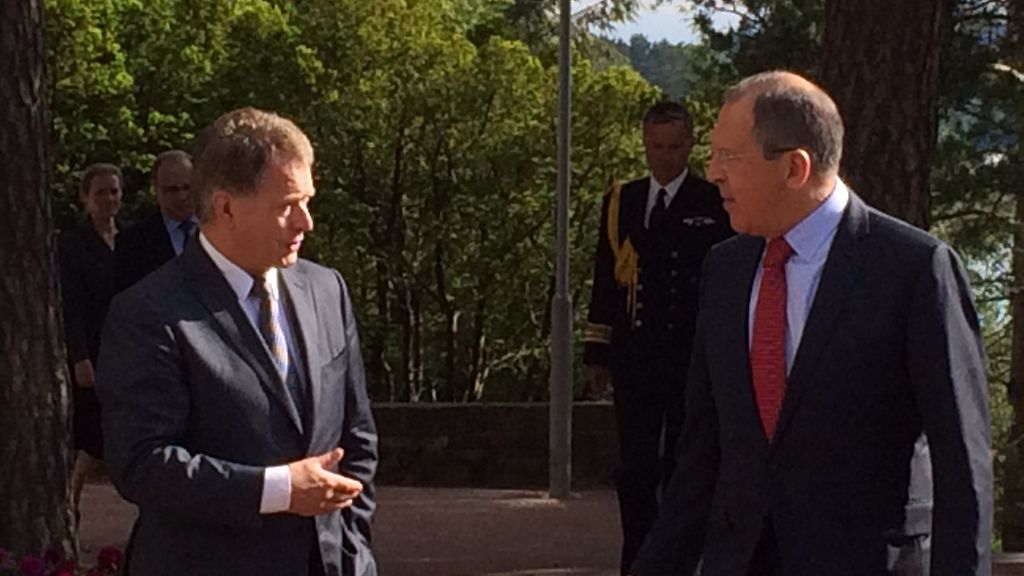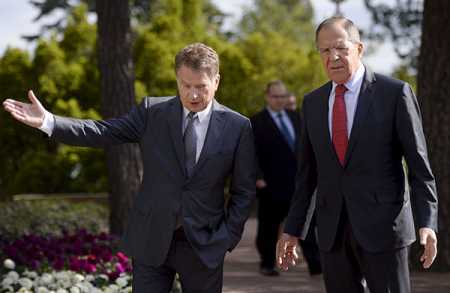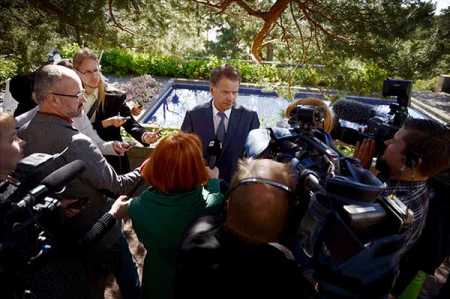
Russian Foreign Minister Sergey Lavrov and Finnish Foreign Minister Erkki Tuomioja at a press conference in Helsinki
HELSINKI — Finland and Sweden have both rejected claims, made by a senior Russian adviser to Russian President Vladimir Putin, that “Russophobia” is pushing the two non-aligned Nordic states “dangerously closer” to NATO.
Finnish officials described the “Russophobia” claim, made by Putin’s senior political adviser, Sergei Markov, as “unfounded” and “alarmist,” while Swedish Foreign Minister Carl Bildt said the embedded meaning in Markov’s remarks smacked of a return by Russia to old school “Cold War intimidation.”
“Finland should think of the consequences, if it ponders joining NATO. It must ask could joining start World War III? Anti-Semitism started World War II. Russophobia can start a third world war. Finland is one of the most Russophobic countries in Europe, after Sweden, Poland and the Baltic countries,” said Markov in interviews with Swedish and Finnish media.

NATO, said Markov, had no positive role to play in European defense as it is, according to the political adviser, “an organization virtually controlled by the United States.” Similarly, Markov described the European Union, and its 28 member states, as “colonies of the US” with no truly independent security or political policies.
“We need to reduce tensions and resolve the crisis in Ukraine. Russia needs to engage in finding a resolution and stop using Cold War language against its near neighbors,” Bildt said.
The claims being made by Markov clearly have no basis in fact, said Kristian Gerner, a political analyst and Russia specialist at Sweden’s University of Lund.

Kristian Gerner, Sweden’s University of Lund
“They border on the paranoid and are somewhat hysterical. Perhaps Russia is irate over Swedish Foreign Minister Bildt’s efforts to find a solution to the Ukraine crisis,” Gerner said.
Markov’s heated comments, which were made on the eve of bilateral talks between Russian Foreign Minister Sergei Lavrov and Finnish political leaders in Helsinki and in the southwest coast town of Naantali on Monday and Tuesday, have further inflamed growing tensions between Moscow and Nordic governments.
The Finnish delegation meeting Lavrov in Naantali was headed by President Sauli Niinistö.

President Niinistö meets Russian foreign minister Sergei Lavrov, and had a hard talk
The soured relations between Moscow and Helsinki are complicating discussions between the two countries on developing closer cross-border defense-industrial cooperation. Russia is offering Finland potentially large-scale sub-contracting contracts to support its military modernization programs.
Moscow has repeated its desire, in these talks, that Finland reject NATO membership and instead forge a closer defense relationship with Russia. Moscow has also reiterated its desire for Russia to become the primary supplier of military hardware to Finland’s armed forces.
However, the position adopted by Finland’s negotiators is that the door to NATO membership will “remain open.”

The deteriorating relations between Russia and neighboring Nordic and Baltic states, which centers almost exclusively on Russia’s provocative role in the crisis in Ukraine, was discussed when Niinistö met Lavrov in Naantali.

Niinistö calls on Russia to take measures to alleviate Ukraine crisis
Niinistö said the focus needed to be on building bridges of cooperation and goodwill between Europe and Russia, and not on raising regional tensions through inflammatory language, statements or actions. Finland, he said, is ready to serve as a “good broker” to help all sides rebuild trust and stability.
“Russia understands that the conflict in Ukraine has generated debate in Finland over this country’s own security policy. It’s important that President Putin understands Finland’s position on NATO membership in this debate. Finland accepts that Russia is working to find a solution to the acute conflict in Ukraine, but it needs to do more,” Niinistö said.

No comments:
Post a Comment